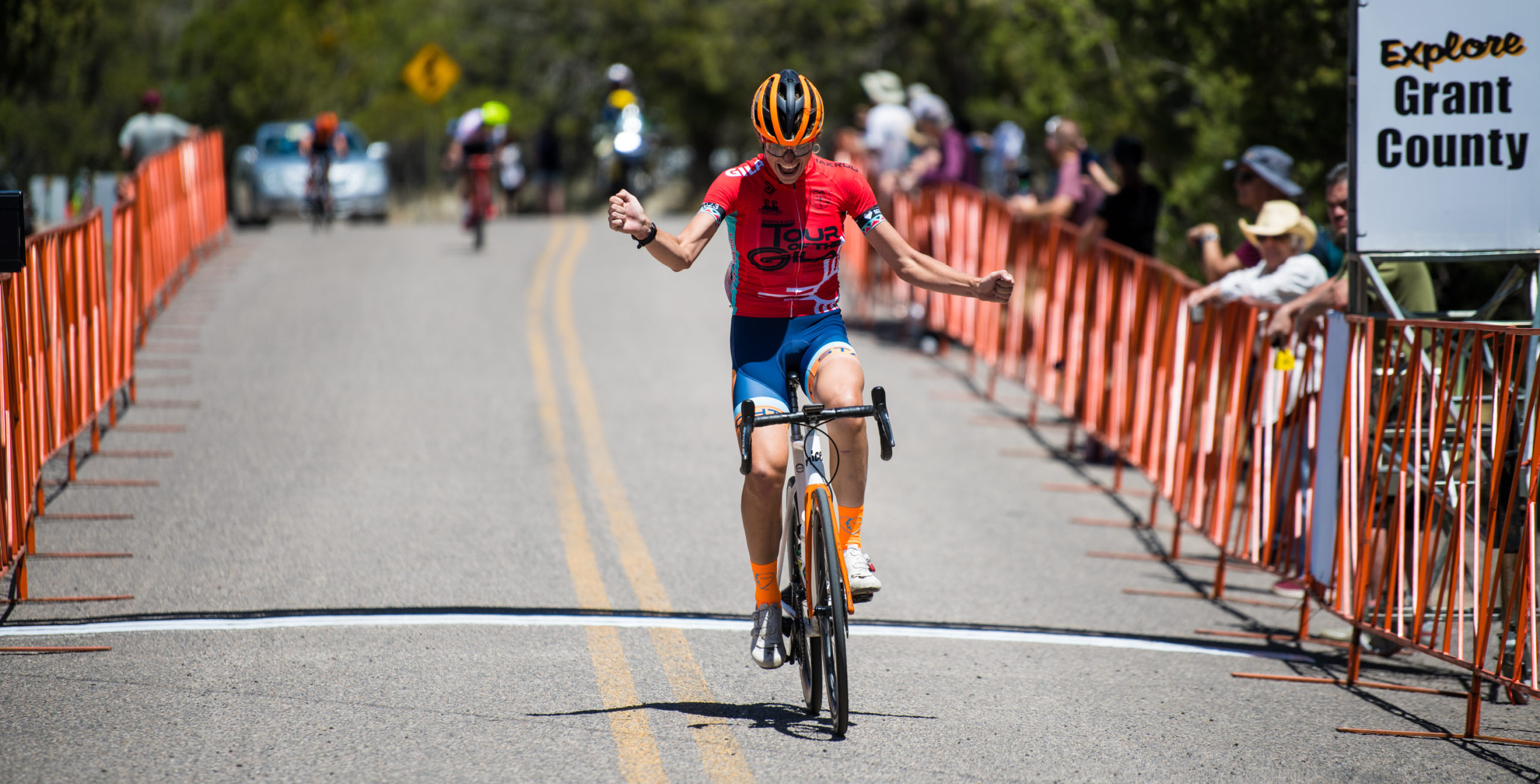CYCLING
UCI defends transgender policy after Austin Killips triumph, but opposition remains

Cycling’s governing body the UCI has defended its policy on transgender athletes competing in female events after American Austin Killips fuelled the debate by winning the Tour of the Gila in New Mexico on Sunday.
The 27-year-old Austin Killips won the fifth and final stage of the Tour of the Gila to become the first transgender cyclist to triumph in an official UCI stage race.
Killips, who began racing in 2019, said that she had been the subject of a “week of nonsense” on the internet.
“After a week of nonsense on the internet I’m especially thankful to everyone in the peloton and sport who continue to affirm that Twitter is not real life,” Killips wrote on Instagram.
“I love my peers and competitors and am grateful for every opportunity I get to learn and grow as a person and athlete on course together.”
Unlike some international sporting bodies such as World Athletics, the UCI allows transgender riders to compete in women’s races, prompting criticism from the likes of American former Olympian Inga Thompson who said the decision was “effectively killing off women’s cycling”.
Thompson referred on Twitter to a survey last year by a leading riders’ union which showed that over 90% of professional women’s cyclists opposed racing against transgender athletes but she said their voices were not being heard.
The Telegraph reported that the Cyclistes Professionnels Associes (CPA), which represents men’s and women’s riders, had conducted the survey of its female members before making representations on the subject to the UCI.
The UCI toughened its rules for transgender women to compete in its events last year, halving the maximum permitted plasma testosterone level to 2.5 nanomoles per litre and doubling the transition period to 24 months.
On the face of it, it seems a step further to ensure fair competition in female races and events, but the question that continues to hang uncomfortably is: why should transgender women, in particular, be in the female category at all? Transgender women are people born as biological males who have chosen to live and identify as female.
In a statement released on 2 May, 2023 the UCI said: “The UCI acknowledges that transgender athletes may wish to compete in accordance with their gender identity.
“The UCI rules are based on the latest scientific knowledge and have been applied in a consistent manner. The UCI continues to follow the evolution of scientific findings and may change its rules in the future as scientific knowledge evolves.”

Austin Killips rides to a Gila Monster stage win and solidifies overall victory. (Photo: Tour of the Gila)
Few transgender athletes
Transgender advocates argue that transgender females do not identify as male and therefore should compete as females (as those are the only two categories that currently exist).
But in a sporting context, gender identity and physiology are not aligned.
It’s a highly emotive subject because a person’s right to identify their gender might be acceptable in the normal course of life. But in elite sports, where categories exist for clear biological reasons, gender identification does not necessarily make it fair from a physiological standpoint.
The evidence overwhelmingly shows that if female categories aren’t ring-fenced from male participation, then females would simply not be successful at the highest level.
While advocates for transgender inclusion argue that there are relatively few transgender women athletes, and not enough studies have been done to ascertain what the benefits are, any decision taken could set a future legal precedent.
For the sport of athletics, there have been no cases of transgender women competing in the female category at an elite level.
But this issue permeates all the way down to amateur and school sports, where blurring the lines between male and female categories has the potential to be more problematic.
Sports such as swimming, rugby union and rugby league have already banned transgender women, who have gone through male puberty, from competing in female categories, using the issue of fairness as a benchmark.
Ban on transgender student athletes passes US House
On 20 April, the US House of Representatives passed a Republican bill intended to ban transgender women and girls from competing in women’s and girls’ school sports, delivering at least a short-term victory to social conservatives.
The House passed the measure by 219-203 but it has little chance of passing the Democratic-controlled Senate.
President Joe Biden has also voiced his opposition to the bill, calling it discriminatory, and has vowed to veto it if needed.
Still, the vote was a win for House Speaker Kevin McCarthy who hopes to keep his narrow Republican majority unified, as a fight over raising the nation’s debt ceiling looms.
“There’s a reason why there’s men and women’s sports,” McCarthy told reporters on the grounds of the Capitol, where he held a news conference with three female athletes who had competed with transgender athletes and lost.
“It’s about fairness. And if there’s one final fibre of America, it’s about giving people an opportunity.”
If passed, the bill would change the civil rights law known as Title IX to require that a student’s sex be “based on an individual’s reproductive biology and genetics at birth.”
UCI following the science
In a statement released by the UCI on 16 June 2022 they admitted that some physiological advantages remained even after lowering testosterone levels.
“In March 2020, the UCI published rules governing the participation of transgender athletes in events on the UCI International Calendar in the category corresponding to their new gender identity,” the statement read.
“Although these rules are stricter and more restrictive than those published by the International Olympic Committee (IOC) in 2015, the UCI has begun consideration on their adjustment following the publication of new scientific studies in 2020 and 2021.
“The principle of eligibility of transgender athletes (in particular female athletes, i.e. those who have made a transition from male to female) is based on the reversibility under low blood testosterone (the level commonly observed in “born female” athletes) of the physiological abilities that determine sports performance, and on the time needed to achieve this reversibility.
“The latest scientific publications clearly demonstrate that the return of markers of endurance capacity to “female level” occurs within six to eight months under low blood testosterone, while the awaited adaptations in muscle mass and muscle strength/power take much longer (two years minimum according to a recent study).
“Given the important role played by muscle strength and power in cycling performance, the UCI has decided to increase the transition period on low testosterone from 12 to 24 months.
“In addition, the UCI has decided to lower the maximum permitted plasma testosterone level (currently 5 nmol/L) to 2.5 nmol/L. This value corresponds to the maximum testosterone level found in 99.99% of the female population.
“This adjustment of the UCI’s eligibility rules is based on the state of scientific knowledge published to date in this area and is intended to promote the integration of transgender athletes into competitive sport, while maintaining fairness, equal opportunities and the safety of competitions.
“The new rules will come into force on 1 July, 2022. They may change in the future as scientific knowledge evolves.
“Moreover, the UCI envisages discussions with other International Federations about the possibility of supporting a research programme whose objective would be to study the evolution of the physical performance of highly trained athletes under transitional hormone treatment.”
British Cycling changed its rules last year to ban transgender women from elite races, pending a full review. DM/Reuters


















 Become an Insider
Become an Insider
No to UCI. Having a certain level of testosterone in your blood does not make you female! We are more than that and our femaleness can not simply be replicated by surgery, medication and will. We are half the population on earth and deserve the protection of our female only spaces from the whims and feelings of males.
UCI, listen to your athletes, they don’t want to compete against males, and they shouldn’t have to.
Gosh, to me the answer is simple, expand the categories. Male, female, transgender male to female and the forth category, transgender female to male.